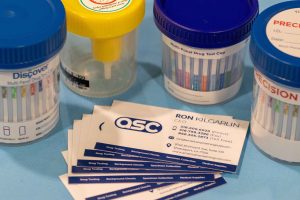Unveiling the Truth: Can Over-the-Counter or Prescription Medications Trigger False-Positive Test Results?


In a world where drug testing has become a routine part of many aspects of life, from employment to sports competitions, the accuracy of these tests is paramount. Individuals often find themselves questioning whether common medications, whether purchased over the counter or prescribed by a doctor, can lead to false-positive test results. This article aims to shed light on the complexities of drug testing and explore the instances where both over-the-counter (OTC) and prescription medications might give rise to false-positive outcomes.
Understanding False-Positive Results: A Complex Landscape
Drug tests are designed to detect specific substances or metabolites in the body, indicating recent use or exposure. However, the possibility of false-positive results exists due to the inherent complexities of the human body and the various substances it may come into contact with. False positives occur when a test incorrectly identifies the presence of a particular substance.
Standard drug tests, such as urine, blood, and saliva tests, are generally reliable. However, they could be more foolproof, and certain factors can contribute to misleading results. Recognizing that false positives are relatively rare is essential.
Over-the-Counter Medications: Potential Culprits
Over-the-counter medications, which are readily available without a prescription, can sometimes contain substances that mimic or cross-react with the compounds targeted in drug tests. One classic example is the use of certain decongestants. Pseudoephedrine, found in some cold and flu medications, may trigger a positive result for amphetamines in some urine tests.
Another group of over-the-counter medications that could potentially lead to false positives are antihistamines. These drugs, commonly used to treat allergies, may contain compounds that cross-react with methamphetamine tests. While the likelihood of a false positive due to antihistamines is relatively low, it underscores the importance of considering all factors when interpreting test results.
Even seemingly harmless substances like poppy seeds can complicate drug test results. Consuming poppy seeds, often found in baked goods, can yield positive results for opiates, as they contain trace amounts of morphine.
Prescription Medications: Navigating the Complexity
Prescription medications specifically tailored to an individual’s medical needs may also contribute to false-positive test results. For instance, certain antibiotics can produce positive results for opiates or amphetamines in some drug tests. Rifampin, a commonly prescribed antibiotic, is known to cause false positives for opiates, while quinolone antibiotics may trigger positive results for opioids.
In addition to antibiotics, antidepressants and antipsychotic medications can pose challenges in drug testing. Some antidepressants may yield false positives for amphetamines or LSD, emphasizing the importance of informing testing personnel about any prescribed medications before undergoing a drug test.
Moreover, medications used in the treatment of various medical conditions, such as epilepsy or attention deficit hyperactivity disorder (ADHD), may contain compounds that could potentially trigger positive results. It is crucial for individuals undergoing drug tests to disclose their medical history and current medications to ensure accurate interpretation of results.
Mitigating the Risk: Communication and Confirmatory Testing
Effective communication minimizes the risk of false positives associated with over-the-counter and prescription medications. Individuals subject to drug testing should openly discuss their medication regimens with healthcare providers and testing personnel. A comprehensive list of all medications, including OTC drugs and supplements, can help tailor the testing approach and interpretation.
Confirmatory testing, which involves more sophisticated and precise methods, can be employed to verify the results of initial drug tests. Gas chromatography-mass spectrometry (GC-MS) and liquid chromatography-mass spectrometry (LC-MS) are confirmatory tests that accurately identify specific substances and distinguish between similar compounds.
Employers and testing facilities should also stay informed about advancements in drug testing technology and regularly review testing protocols to ensure accuracy and reliability. Training personnel to recognize potential sources of false positives and addressing them in testing procedures can contribute to more accurate and fair outcomes.
Navigating the Nuances of Drug Testing
In drug testing, distinguishing between true and false positives is crucial for fairness and accuracy. Over-the-counter and prescription medications, while generally safe and effective for their intended purposes, can introduce complexities into the drug testing landscape.
By fostering open communication, implementing confirmatory testing when necessary, and staying vigilant about testing protocols, we can navigate the nuances of drug testing and ensure that individuals are not unfairly penalized due to factors beyond their control. Ultimately, the goal should be to strike a balance between maintaining a drug-free environment and acknowledging the potential for false-positive results in the intricate web of medication use.
